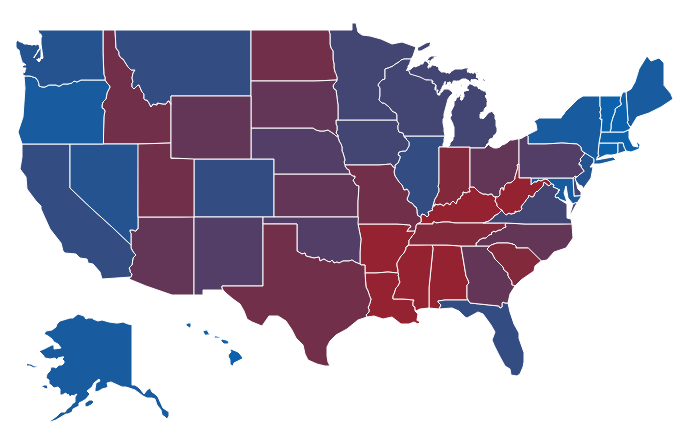
It’s no secret that if Brett Kavanaugh is confirmed as s Supreme Court Justice, the constitutional right to an abortion will be on very thin ice. If, as widely expected, a five-Justice majority of the Court with Kavanaugh on board finds a way to reverse or significantly modify Roe v. Wade in the near future, then it will suddenly, for the first time in nearly a half-century, matter even more where women happen to live if they need abortion services.
Looking forward to that new world of state-determined abortion policies, the Washington Examiner usefully put together a state-by-state analysis from 2014 Pew data, illustrating the balance of public opinion on the legality of abortion (a slightly different question from the “do you want to see Roe v. Wade reversed” polls we’ve been seeing, and a much more relevant finding than those relying on confusing self-identification labels like “pro-choice” and “pro-life”). It shows, unsurprisingly, that people in liberal states like Massachusetts, Vermont, Connecticut, Hawaii and New York support keeping abortion totally or mostly legal by at least a two-to-one margin. Meanwhile at least 55 percent of those in seven southern or border states (Tennessee, Louisiana, Mississippi, Kentucky, Alabama, Arkansas and West Virginia) want most or all abortions to be banned.

But if you don’t want to consult public opinion polls to determine whether you can carry your reproductive rights across state borders, there is a simpler test: the right to choose as we have known it is not likely to survive in any state governed by Republicans.
According to the Guttmacher Institute and a recent overview from the Guardian, there are 21 states that have enacted a clearly unconstitutional (under current law) abortion ban, including four with “trigger” laws that would instantly ban abortion entirely if Roe is reversed. Florida has tried to enact defiant abortion restrictions, but has been thwarted by federal judges. Another state, Michigan, has a pre-Roe “zombie” law banning nearly all abortions that would become effective again if Roe is reversed (so does Massachusetts, but a statute repealing it will be signed by the governor any day now). Nine of those 23 states (Florida, Michigan, Wisconsin, Iowa, Oklahoma, Nebraska, Arizona, North Carolina and Ohio) have pro-choice pluralities in public opinion according to the Pew data. What nearly all of them have in common, though, is iron Republican control of state government.
That’s right: 21 of the 23 states exhibiting official hostility to abortion rights are GOP “trifecta” states (where Republicans control both the governorship and both legislative chambers). One of the two exceptions is North Carolina, where a 20-week abortion ban was enacted before Democratic Gov. Roy Cooper took office.
Given the polarization of the two parties over this and other issues, there’s obviously a lot of overlap between states where majorities oppose legal abortion and support for the GOP. But that doesn’t explain places like Iowa (a 52/46 majority there supports keeping abortion legal), where the GOP legislature recently enacted and the GOP governor signed the most restrictive abortion law in the country.
In much of the country, Republican lawmakers are not going to pause to conduct a poll before taking advantage of fresh opportunities to restrict reproductive rights, and many of them would gladly put their political careers at risk (or in some cases, avoid a primary challenge) to reward the RTL activists who have become so important to the GOP’s electoral machinery and fundraising in recent years. If you care about reproductive rights, sure, you should fight to keep Brett Kavanaugh off the Supreme Court. But your real efforts in 2018 and 2020 should be aimed at busting up Republican control of so many states, where the real action may be in the not-too-distant future.






























